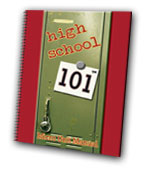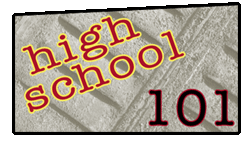|
|
|
Unit 1: Communication Skills
Successful relationships at home, in the classroom, and in the workplace depend heavily on people's ability to communicate. Communication is just like any skill — it must be learned and it must be practiced in order to improve. It has been said by many that the ability to communicate is the key that opens the door for young people to succeed. The engaging projects in this unit will create an environment that enables students to develop and improve their public speaking, listening, questioning, networking, and writing skills all under the umbrella of career exploration. Young people who have a vision for their life after school are more apt to see the value of the educational process and therefore commit to completing that process.
If you would like to review complete Micro-Unit 1,
please contact Chad Foster for a PDF sample of this unit.
|
| Top of Page |
|
Unit 2: Personal Learning Styles
Just as no two teachers have the same teaching style, no two students have precisely the same learning style. "In order to get to where I need to be, I must first realize where I am." This quote symbolizes the theme of this unit. Students will begin to identify their personal interests, aptitudes, natural talents, strengths, weaknesses, and learning styles and how all of this affects their daily lives, both inside and outside the classroom. This knowledge, coupled with an understanding of how to apply the knowledge, will give students a distinct advantage in their classroom and workplace endeavors. Activities in this chapter are designed to give students a good idea of what makes them "tick" and a better understanding of how to succeed in their learning environment. If we want students to stick around, it is essential that every student believes that he or she has a better than average chance of succeeding.
If you would like to review complete Micro-Unit 2,
please contact Chad Foster for a PDF sample of this unit.
|
| Top of Page |
|
Unit 3: Technology Literacy
Not surprisingly, 70% of all jobs today require workers to touch a computer on a daily basis. Regardless of the field they choose, the vast majority of today's students will have to use technology in their careers. The degree to which they are literate in technology will play a major role in their quest to succeed. Quite simply, technology literacy is a must if we are ever to level the playing field between students in wealthy districts and those in lower income districts.
As part of this unit, students will focus on research skills and creation of electronic portfolios that will be used as they complete their educational journey and embark on their careers. Students who can maximize the use of technology in the workplace have a distinct advantage over those who are lacking in this area. Raised as a digital generation, students take to this unit like fish to water.
If you would like to review complete Micro-Unit 3,
please contact Chad Foster for a PDF sample of this unit.
|
| Top of Page |
|
Unit 4: People Skills
Studies show that 70% of employees who lose their jobs lose those jobs for one reason - the inability to get along with the people they work with and the people they work for. This is a staggering statistic for sure, and one that seeks the immediate and focused attention of educators. The ability to get along with others will serve students in all aspects of life - in the classroom, at home, and in the workplace. This unit will address conflict resolution, compromise and the power of 'win/win' engagement. Students who possess good people skills will have better experiences with fellow students, teachers, and administrators, leading to a more productive educational experience.
If you would like to review complete Micro-Unit 4,
please contact Chad Foster for a PDF sample of this unit.
|
| Top of Page |
|
Unit 5: Choices / Consequences
While there are no 'magic wands' to help young people always make the right decisions, there are certain processes and practices that can help them weigh facts, figures, risk, and consequences. "If I only knew then what I know now" is a comment often heard from people everywhere. What if there was a formula that could help students know now some of those valuable bits of wisdom that would enable them to make good choices. Everyone knows that hindsight is 20/20 but what does it take to sharpen a student's foresight? This unit will help students understand the dangerous correlation between making minor bad choices now and making major bad choices later. More important, the messages delivered through this unit will convince students that just one destructive decision can destroy the best laid plans, the highest hopes, and the life long dreams of young people from all walks of life.
If you would like to review complete Micro-Unit 5,
please contact Chad Foster for a PDF sample of this unit.
|
| Top of Page |
|
Unit 6: Test Taking/Study Skills
Accountability is here to stay and taking tests plays a major role in that movement. Students participate in last minute review sessions, enjoy testing pep rallies, and have special breakfasts to make sure they do well on these high-stakes tests and yet most young people never really learn to delve into the various strategies they can use to help them perform (in addition to knowing the material, understanding the importance of the test, and tending to do better after a good night's sleep and on a full stomach!).
To the great amazement of many, studying is actually a skill, which means it can be learned and it must be practiced in order to improve. While this is not a skill traditionally taught in school, it is perhaps one of the most critical skills that every student must possess. As long as evaluation is part of the equation in American schools, the ability to effectively study will be essential.
This unit will address the connection between personal learning styles and successful study methods, the role environment has on productive study efforts, and strategies for predicting more accurately what information they will be expected to know. In general, students will learn skills that can help them process the information they have been taught as it relates to preparing for and performing on tests in high school and beyond.
If you would like to review complete Micro-Unit 6,
please contact Chad Foster for a PDF sample of this unit.
|
| Top of Page |
|
Unit 7: Time Management
Organizational and time utilization skills are two of the most critical common denominators of highly successful people. The ability to multi-task is paramount to a successful educational as well as workplace experience. Simply put, students who cannot effectively manage their time and organize their daily activities struggle and, often, these are the students who give up on their educational journey. Faced with the challenge of balancing the demands of school, recreational, social, work, and family activities, the task can seem overwhelming. Young people are strongly encouraged to 'get involved', but most do not have a workable system for managing their involvement. This unit will help students develop their own personal system for managing time, multi-tasking, and organizing their 'full plates'.
If you would like to review complete Micro-Unit 7,
please contact Chad Foster for a PDF sample of this unit.
|
| Top of Page |
|
Unit 8: Business Savvy
Those who succeed in business have the ability to do several things well. Three of the most critical functions needed are the ability to meet challenges, overcome obstacles, and solve problems.
Students who possess these abilities and strive to further develop them will enter the world of work with distinct advantages that will more than likely prove to be the difference between success and failure. Whether in a part-time work environment, as a full-time employee of a small company, or even as a business owner/entrepreneur, a general understanding of 'business savvy' will be invaluable.
This unit will challenge students to solve multiple problems, deal with a variety of challenges and attempt to overcome a number of obstacles in a simulated business environment. A taste of 'doing business' can often be the spark that motivates students to see the value of the educational process.
If you would like to review complete Micro-Unit 8,
please contact Chad Foster for a PDF sample of this unit.
|
| Top of Page |
|
Unit 9: Tolerance / Diversity
One of the most daunting tasks faced by educators is that of dealing with subject matter that clearly should have been addressed by parents at home. Diversity literacy and tolerance are certainly at, or near, the top of the list. These subject areas are wide reaching and have great importance to all students. Indeed, it is a global economy into which graduates will eventually be thrust. The implications of that fact are broad. Students who expect to survive and succeed in that economy will need traits that enable them to live with, work with and socialize with others from all walks of life. Acceptance, tolerance, understanding of differences, and respect for diversity are all essential to the process.
This unit will address the social, personal and professional implications that an absence of these qualities will create. Thought-provoking activities will expose students to the ramifications of intolerance and discrimination.
If you would like to review complete Micro-Unit 9,
please contact Chad Foster for a PDF sample of this unit.
|
| Top of Page |
|
Unit 10: Financial Literacy
Every student will have to deal with money sooner than later. Their ability to make, manage, multiply, and protect their hard-earned money will impact their plans for the future and their quality of life. The primary objective of this unit will be to change the way students think about money so that they will be able to avoid the financial hardships so many young people encounter. Through unique and engaging activities, students will address needs vs. wants, secrets to saving, credit card debt, multiplying money, insurance essentials, and identity theft. This unit will provide students with a dose of real-world wisdom and introduce them to the common denominators of financially successful people.
If you would like to review complete Micro-Unit 10,
please contact Chad Foster for a PDF sample of this unit.
|
| Top of Page |
|


